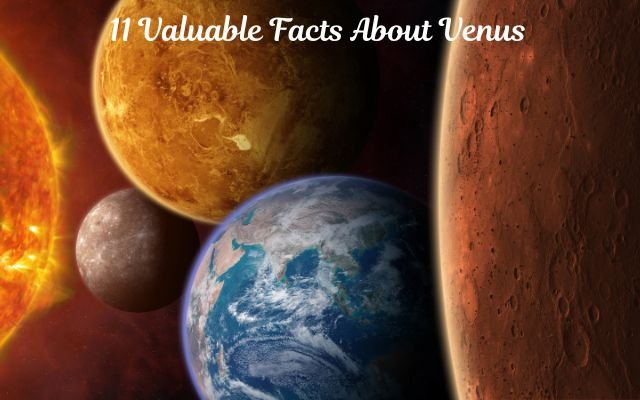11 Valuable Facts About Venus
Discover 11 valuable facts about Venus, the hottest planet in our solar system, from its unique atmosphere to intriguing features!

Venus, solar system’s second planet from the sun, is distinguished from other planets by a number of special qualities. These are 11 valuable facts about Venus, a planet that, despite its harsh circumstances, is sometimes referred to be Earth’s sister because of its similarities. Find out more about Venus’s interesting features!
Table of Contents
Valuable Facts About Venus
1. The Hottest Planet in the Solar System
Even though Venus is not the closest planet to the Sun, it is the hottest. Its average temperature reaches an astounding 867 °F (464 °C). Its dense atmosphere, which is mainly composed of carbon dioxide, a strong greenhouse gas that traps heat, is the main cause of intense heat. Venus is hotter than Mercury, which is closer to the Sun, due to greenhouse effect.
2. Uniform Temperatures
Venus has very constant temperatures. Venus always has a constant temperature, in contrast to Earth where it might change from day to night or from the equator to the poles. It is the only planet where the temperature does not significantly change throughout the day or night.
3. The Morning Star and Evening Star
Venus glows brightly in the sky either before sunrise or shortly after sunset, earning it the nicknames “Morning Star” or “Evening Star.” Venus is a planet, not a star, despite its colloquial moniker. It may be plainly seen with unaided eye since it is after the Sun and the Moon brightest object in sky.
4. No Moons
Among the planets without a moon is Venus. In fact, except from Mercury, it is the only planet in our solar system without any naturally occurring satellites. Its lack of a moon is one of the planets’ distinguishing features.
5. Fast-Rotating Atmosphere
Venus is unique among planets because its atmosphere rotates at a faster rate than the planet itself. This is what we call atmospheric super-rotation. The atmosphere takes only four Earth days to make a full rotation, while Venus takes 243 Earth days to complete one full spin on its axis. As a result, the atmosphere is expanding significantly more quickly than the globe is turning.
6. Opposite Rotation Direction
Most planets in our solar system revolve in the opposite direction of Venus. Venus revolves in the opposite way from the rest of the planets which rotate counter-clockwise including Earth. Though true explanation of this peculiar spin is still unknown, experts assume it resulted from a significant encounter with a big asteroid during the planet’s development.
7. Quick Orbiting
Despite taking a long time to rotate on its axis, Venus orbits the Sun faster than it spins. One orbit around the Sun is completed every 225 Earth days. It’s interesting to note that day on Venus lasts 243 Earth days, as opposed to a year’s 225 Earth days. Venus’s distinctive feature contributes to its intricacy & fascination.
8. Volcanoes Galore
More volcanoes can be found on Venus than any other planet in our solar system. It has a notable amount of volcanic formations with over 1,600 prominent volcanoes documented. Even though it’s thought that most of these volcanoes are extinct, ongoing research points to the potential for volcanic activity. But as of right present, no verifiable active eruptions have been identified.
9. Carbon Dioxide-Rich Atmosphere
About 96.5% of Venus’ atmosphere is made up of carbon dioxide, and the remaining 3.5% is nitrogen. There are trace levels of other gasses. Mass of the atmosphere on Venus is around 92 times that of the atmosphere on Earth. The tremendous heat on the planet’s surface is partly caused by the planet’s thick atmosphere, which produces the strongest greenhouse effect in the Solar System.
10. Hidden Surface
Venus’s surface is completely obscured by clouds, making it impossible to see from Earth. Without the aid of radar and radio waves, it is impossible to see the surface due to the dense clouds obstructing the view. Through a telescope, spectators are able to see the planet’s atmosphere rather than its surface.
11. A Beautiful Name with a Hostile Environment
Ironically, Venus has such a severe atmosphere given her name—it is called after the Roman goddess of beauty and love. Despite having a beautiful name, it is one of the most miserable places in our solar system due to its low air pressure and extreme heat.
- 10 Fascinating Facts About Comets You Need to Know
- 5 Popular Science Facts That Are Completely Wrong
- Is the Dodo Really Extinct? A New Theory
These eleven valuable facts about Venus demonstrate the qualities that set the planet apart and captivate people. Astronomers and space enthusiasts are still interested in Venus because of its intense heat, peculiar spin & status as the hottest planet.



